Meet the swing voters: In the U.S. midterms, women are a potent force
Nov 3, 2018, Tamsin McMahon — The Globe and Mail
Democrats are on a mission to flip middle-class enclaves from red to blue – and women are the key, both as organizers and as voters. But some female millennials are helping the GOP fight back. The Globe and Mail reports from two regions to watch
California: Behind the ‘orange curtain,’ women plan for change
Eileen Padberg was a loyal Republican for 53 years.
She joined the party out of high school, set up a Young Republicans association in Anaheim, Calif., and became a prominent California political consultant, managing dozens of campaigns, including Clint Eastwood’s run for mayor of Carmel.
She clung fiercely to her Republican identity – even as she chafed against the party’s embrace of social conservatism. She published a book about the two years she spent in Iraq teaching local women how to compete for work on U.S.-sponsored reconstruction contracts. Pro-choice, she fought to remove the issue of abortion from the Republican platform – but lost.
Over the years, she watched as her political friends left the party and urged her to do the same. She believed Republicans would return to the roots that had attracted her to the party: small government, personal responsibility, a strong national defence.
But this fall, as Republican lawmakers in Congress picked apart a California university professor’s accusations of sexual assault, Ms. Padberg, a sexual-assault survivor herself, finally decided she’d had enough. She dumped her party affiliation and registered as an independent.
“The words that I was hearing from those old white guys were just insulting,” she said. “I couldn’t do it any more.”
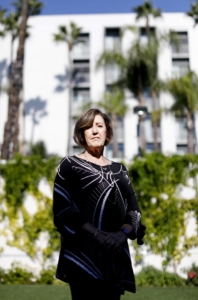
She believes she is not alone, that many women like her have been turned off by the Republican Party under President Donald Trump – and that their anger will be a potent force in Tuesday’s midterm elections. “I’ve been holding on by a thin thread for a long time,” she said. “And I suspect that if I went that way, there are a lot of women who did.”
Ms. Padberg, 74, lives in the city of Laguna Niguel, in Orange County, a network of subdivisions, office buildings, theme parks and shopping malls that sprawls down the California coast south of Los Angeles. Places like this have become the battleground in American politics: suburban and traditionally conservative, populated by affluent white voters and an influx of immigrants attracted by good schools, safe neighbourhoods and decent jobs.
In California, moving to Orange County has long been described as going behind the “orange curtain,” the line where the state’s blue politics become red. But Orange County has been gradually turning purple: Demographic and economic shifts have transformed white, middle-class neighbourhoods whose fortunes were tied to the defence industry into a diverse mix of knowledge-economy professionals and service workers.
Two years ago, voters here backed Hillary Clinton by almost five percentage points, the first time the county has supported a Democratic presidential nominee in 80 years. Ms. Clinton’s win here has thrust Orange County into the forefront of the Democratic Party’s efforts to capture the House of Representatives this fall – the first time in years that California has been so central to national politics. The party has poured manpower and money into flipping the region’s four Republican-held congressional seats. Barack Obama and Joe Biden have both come to town.
Central to that push will be Orange County’s female voters. In a region where white women were long counted on as reliable Republican voters, the 2016 election has brought Democratic women out of the shadows.
“For many of us, our politics was something we kept close to the breast,” said Lorellen Green, a physician and former professional dancer. “It took something sort of cataclysmic like this for us to start saying, ‘I’m a Democrat.’”
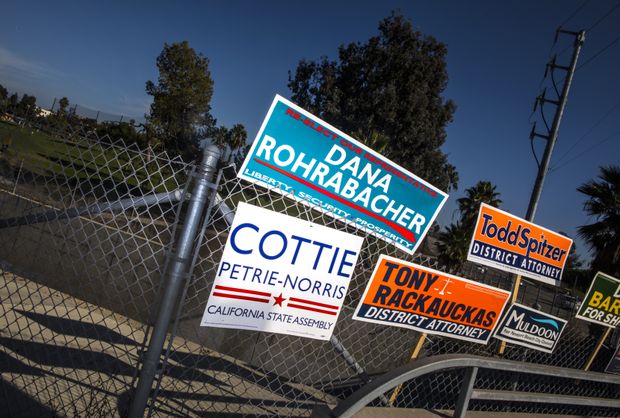
The energy among women on the left has inspired a flurry of grassroots efforts to get Democratic voters to the polls and to start building the kind of ground game that Orange County Republicans have steadily constructed over decades.
After the 2016 election, Joanna Weiss, 46, a corporate attorney who is now a stay-at-home mom, started keeping track of all her female friends grieving Ms. Clinton’s loss on social media. When she got to 35 names, she invited the women to her home. “We’ll drink a lot of wine, write letters to Congress and maybe we’ll form a political action committee,” she told them.
More than 20 women showed up. Soon the meetings grew too large for her house. Eventually, Ms. Weiss formed Women for American Values and Ethics (WAVE), which she describes as a support system for progressive women in Orange County.
The group now has about 700 members and has created its own Super PAC, an independent political committee that can spend unlimited amounts on advertising as long as it doesn’t co-ordinate directly with parties or candidates. It has raised more than US$200,000, according to public records, including US$75,000 from an April fundraiser hosted by comedian Chelsea Handler.
On a breezy night in October, more than 60 people attended a WAVE ballot party – an information session about candidates and ballot measures – in upscale Newport Beach.
Linda Sanchez, a Democratic congresswoman from neighbouring Los Angeles County who was invited to kick off the party, pointed to a man in the audience who had raised his hand to ask her a question.
“Every time I talk to a group of people, we open it for a Q&A – and women never ask the first question. And I’m tired of that,” she said. “I am not going to answer this man’s question.”
The man lowered his hand. The room, filled mostly with women, broke into applause.
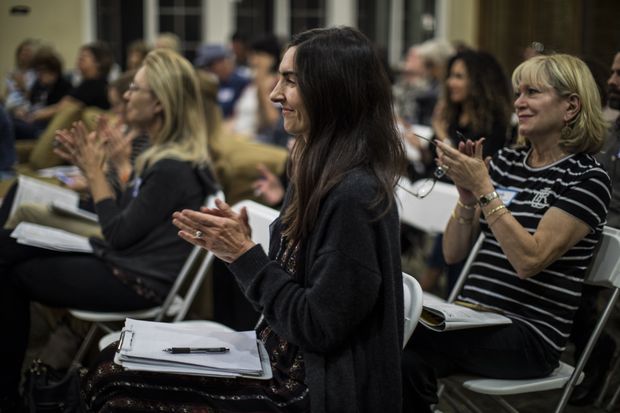
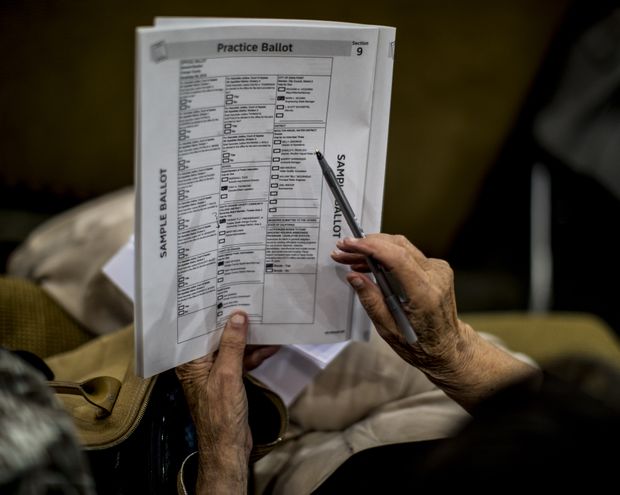
Across town, another group of women gathered at Ms. Green’s home for the inaugural meeting of the Women’s Activist Book Club. The women were members of Imagine Action OC, a grassroots group that has also hosted ballot parties, fundraisers and candidate meet-and-greets. “I see this as part of being a good mom,” said Faye Hezar, one of the group’s organizers and a commercial property manager who moved to California from Iran. “I don’t want my children and my grandchildren to live in a country like this.”
Both Democrats and Republicans caution that Ms. Clinton’s victory here in 2016 may be less a sign that the county’s politics are moving leftward than an indication that many of the region’s moderately conservative voters did not take to Mr. Trump.
Renette Crone was among those early Trump skeptics. Her choice for the Republican nominee was Marco Rubio. But over time she has come to appreciate how the President’s unorthodox style has confounded his political opponents both at home and abroad.
“He does make us cringe,” said Ms. Crone, who has put her interior design business in the affluent waterfront community of Corona Del Mar on hold so she can co-ordinate midterm efforts for the Newport Harbor Republican Women’s Club. “You just have to shrug it off and say: We don’t get our spiritual guidance from Donald Trump.”
She concedes that women are galvanized on the left but believes Republicans remain the establishment party in Orange County. Her group primarily targets fiscally conservative women with messages about Republican tax cuts, rather than expounding on the future of Roe vs. Wade. “We don’t need to go to battle on social issues,” she said. “We’re all about keeping it in the mainstream.”

Where a blue wave may run aground in Orange County is among moderate conservative voters who feel alienated by Mr. Trump’s rhetoric but have reservations about the far-left elements of the Democratic Party.
Voters like Lisa Bauer. A retired human resources manager for the county government, Ms. Bauer, 58, is a long-time Republican. She supported Ms. Clinton in 2016 but also backed her local Republican congresswoman, Mimi Walters. Since then, she has felt increasingly put off by Mr. Trump, whom she describes as “particularly insulting to women,” and by Ms. Walters, whose office has not responded to any of her requests.
This year, she has offered to volunteer for Ms. Walter’s Democratic opponent, law professor Katie Porter. But she has registered to vote as an independent, worrying that the Democrats sometimes push their progressive policies too far. She points to a proposed bill in the state legislature – vetoed by Governor Jerry Brown – that would have allowed undocumented immigrants to serve on local city councils and school boards.
Those positions should be reserved for U.S. citizens, she said. “That’s what gives the Democrats a bad name.”
Orange County’s Democratic candidates have tried to appeal to moderate voters by flashing their conservative bona fides.
Harley Rouda, a real-estate developer challenging veteran Republican Dana Rohrabacher, and lottery winner Gil Cisneros, who is running for a seat vacated by Republican Ed Royce, openly talk about being former Republicans.
In a hotly contested race in a neighbouring, Republican-controlled suburban swath of Los Angeles County, ads for Democrat Katie Hill feature her father, a police officer and Republican voter, and describe how she grew up around guns.
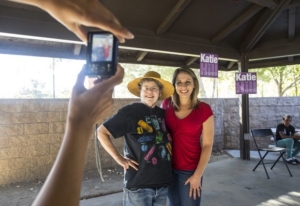
Sheila Bigelow, 64, has volunteered on Ms. Hill’s campaign as a way to “make it up to the universe” for voting for Mr. Trump.
A NASA employee who works at nearby Edwards Air Force Base, she wasn’t bothered by his comments about grabbing women – but changed her mind when he attacked Meryl Streep on Twitter.
“I said: Wait a minute. He’s going to be president in the next few days. Why is he going after the greatest actress of our generation?” she said. “It’s just gotten worse and worse and worse.”
She is skeptical, however, that there are enough voters who feel that way in this long, dry stretch of Southern California. “I disagree with practically everything that Trump has to say, but on this thing I think he’s right: There may not be a blue wave.”
Ms. Padberg views things differently. A veteran of more than 100 Republican political campaigns, many of them supporting female candidates and women’s issues, she sees changes coming.
“I think women finally got it. We finally said: We’re done here. And I think it shows up in this election. Not just in Orange County, but across the country.”



